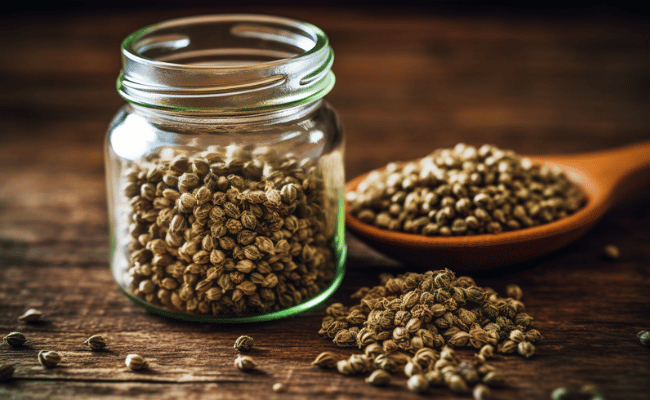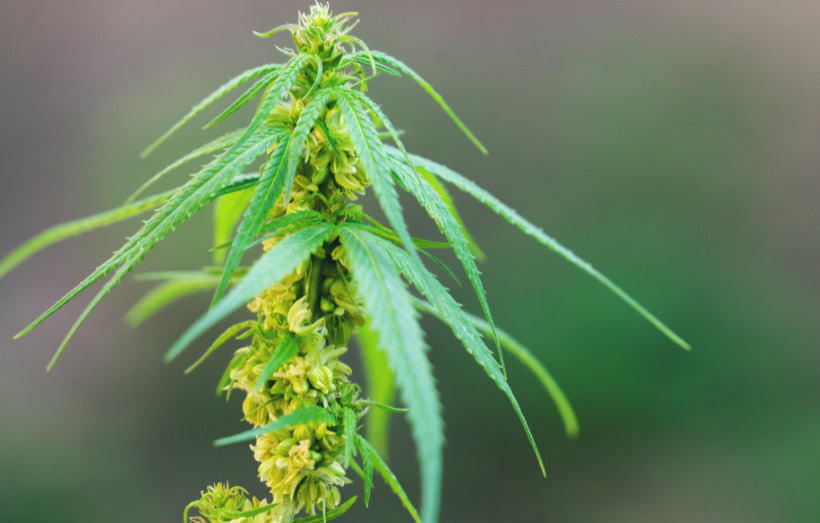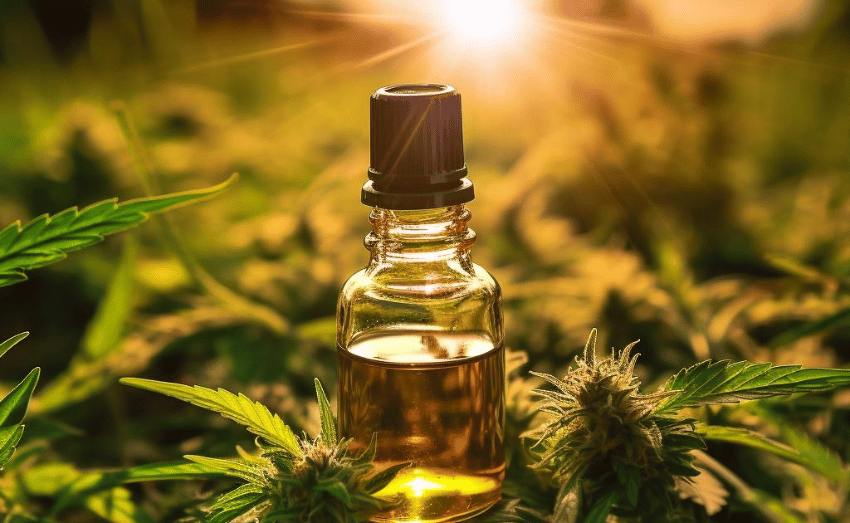Hemp seeds and products have taken the world by storm, from human health circles to pet nutrition spaces. The name ‘hemp’ might be familiar to some, but for beginners stepping into the realm of dog nutrition, it might seem a little overwhelming. You might wonder: Can I give my dog hemp seeds every day? Well, we’re diving deep to answer that burning question for you.
- What’s All the Buzz About Hemp Seeds?
- The Nutritional Makeup of Hemp Seeds
- Health Benefits for Dogs
- Safety and Hemp Seeds
- Understanding Daily Hemp Seed Intake for Dogs
- Can I give hemp seeds to my dog every day?
- The Importance of Moderation: The Potential Concerns
- Hemp Seeds: A Simplified Perspective
- Implementing Hemp Seeds in Your Dog’s Diet
- Starting on the Right Paw
- Conclusion
- FAQs
What’s All the Buzz About Hemp Seeds?
Hemp seeds, the offspring of the Cannabis sativa plant, have taken the nutritional world by storm. Often hailed as “superfoods”, these little wonders pack a nutritional punch that has numerous health aficionados, including pet enthusiasts, singing their praises. But what makes them so special?
The Nutritional Makeup of Hemp Seeds
Hemp seeds are a veritable treasure trove of nutrients. According to NutritionData, a trusted database on food nutrition:
- Essential Fatty Acids: Hemp seeds boast an impressive balance of omega-3 and omega-6 fatty acids. These are vital for heart health, brain function, and inflammation control. For dogs, a proper balance of these fatty acids can promote shinier coats and healthier skin.
- Protein Powerhouse: These seeds are a complete protein source, meaning they provide all the essential amino acids. In fact, by weight, hemp seeds provide a similar amount of protein as beef and lamb.
- Rich in Vitamins and Minerals: They are also a good source of vitamin E and minerals, including phosphorus, potassium, sodium, magnesium, sulfur, calcium, iron, and zinc.
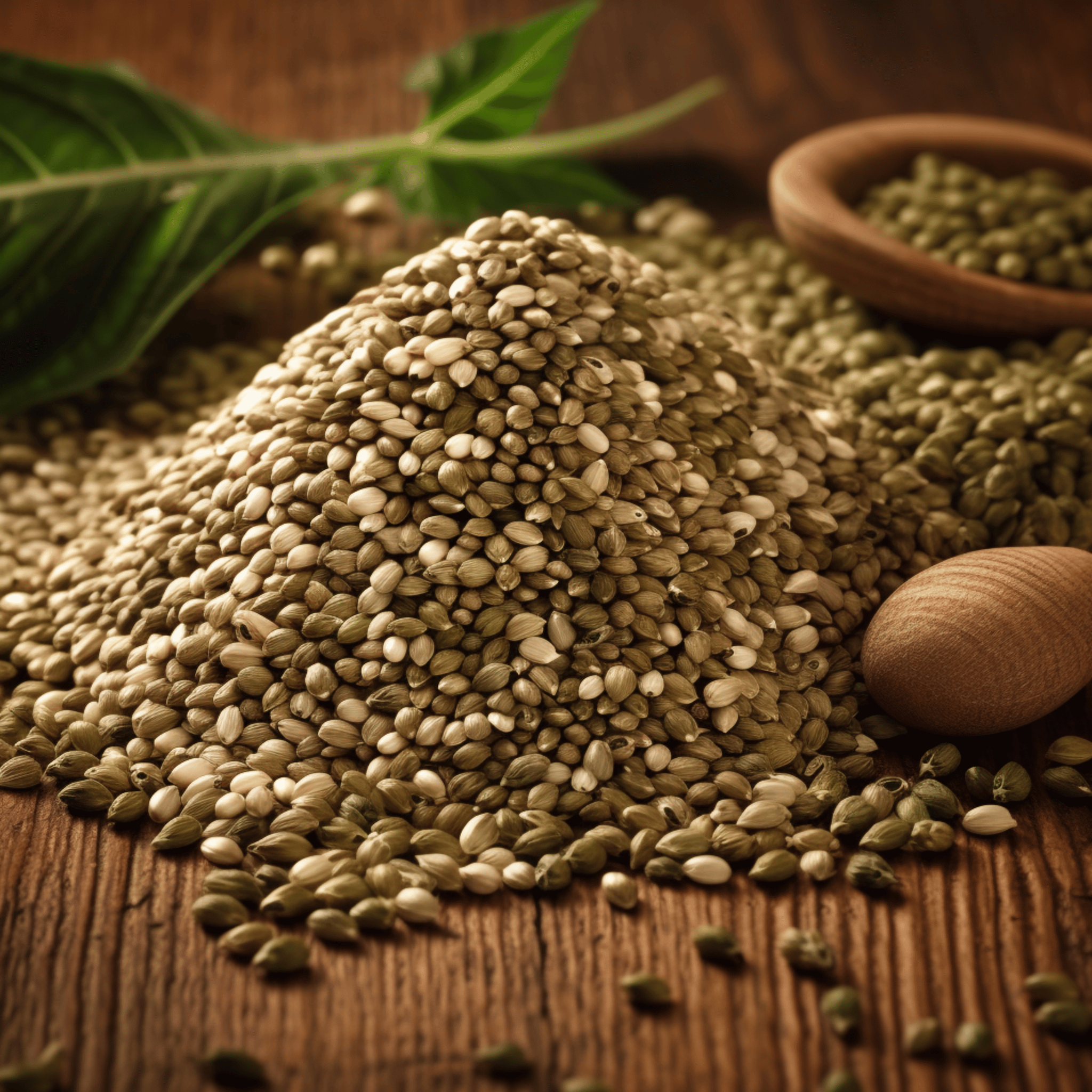
Health Benefits for Dogs
Drawing insights from PetMD, a reputable resource in pet health:
- Improved Skin and Coat: Thanks to the omega fatty acids, hemp seeds can help reduce skin allergies in dogs and give them a glossier, healthier coat.
- Joint Health: The anti-inflammatory properties of the fatty acids in hemp seeds might assist in reducing symptoms of joint pain or arthritis in aging dogs.
- Digestive Health: Hemp seeds contain dietary fiber. Introducing them moderately into a dog’s diet can promote healthy digestion and combat constipation.
Safety and Hemp Seeds
While hemp seeds have various potential benefits for canines, always introduce them slowly into your dog’s diet. As with any dietary change, it’s crucial to monitor for any adverse reactions. And remember, always consult with a veterinarian before making significant changes to a pet’s diet.
The “buzz” around hemp seeds is well-deserved. Their rich nutrient profile makes them a beneficial addition to diets, including those of our four-legged friends. However, as always, moderation and consultation with professionals ensure the best outcomes.

Understanding Daily Hemp Seed Intake for Dogs
Hemp seeds, known as a nutritional powerhouse for humans, are gradually becoming popular in canine diets. Their potential benefits have piqued the interest of pet owners. But as with anything, it’s essential to understand the right dosage and possible implications. Let’s embark on this educational journey.
Can I give hemp seeds to my dog every day?
The right quantity is the key when introducing any new dietary element to your pet.
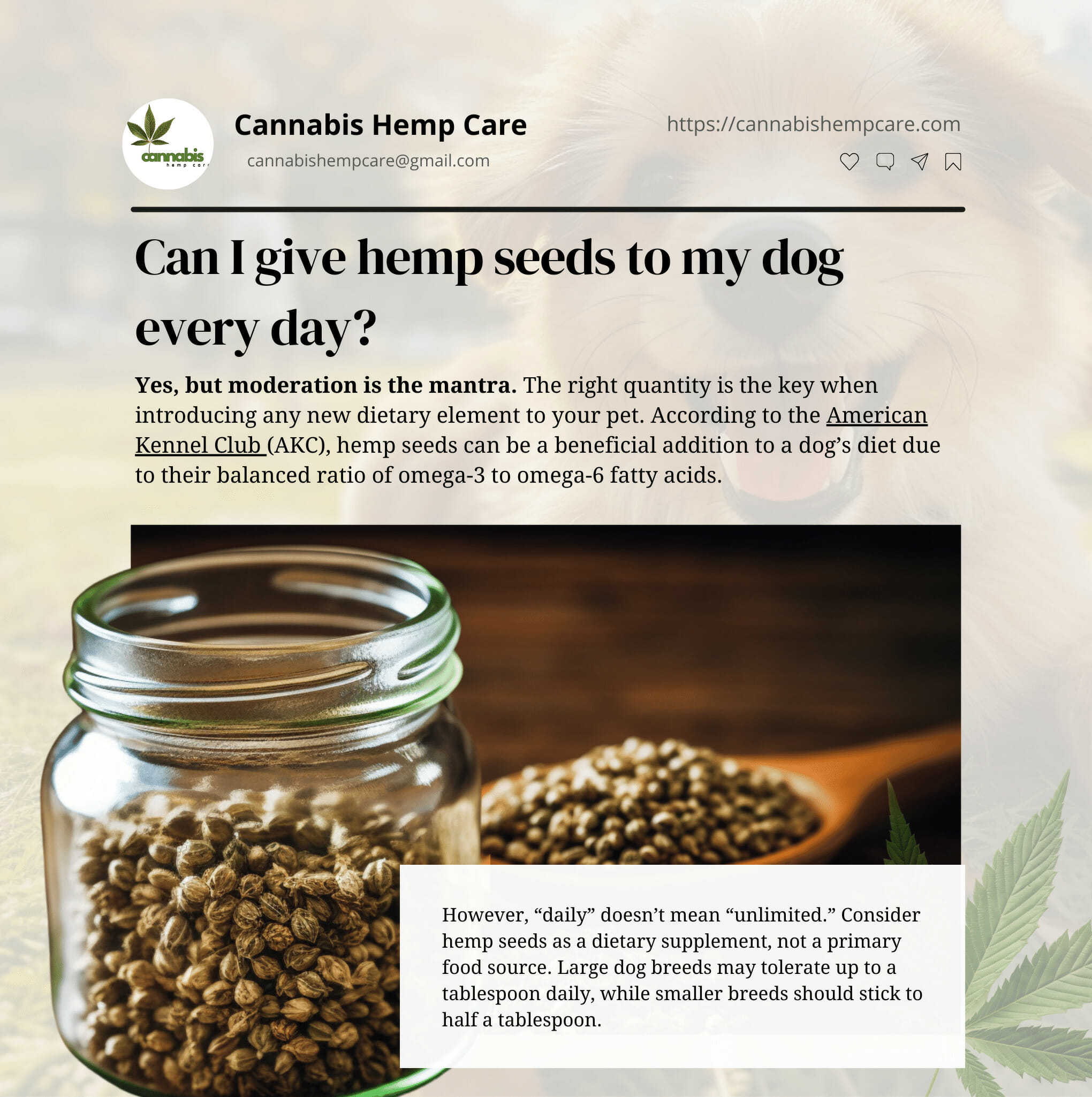
- Yes, but moderation is the mantra. According to the American Kennel Club (AKC), hemp seeds can be a beneficial addition to a dog’s diet due to their balanced ratio of omega-3 to omega-6 fatty acids.
However, “daily” doesn’t mean “unlimited.” Consider hemp seeds as a dietary supplement, not a primary food source. Large dog breeds may tolerate up to a tablespoon daily, while smaller breeds should stick to half a tablespoon.
The Importance of Moderation: The Potential Concerns
Hemp seeds have numerous benefits, but overconsumption can lead to challenges.
- Digestion Issues: A study published in the Journal of Animal Physiology and Animal Nutrition indicated that introducing new foods abruptly can upset a dog’s digestive system. This is because their gut microbiota needs time to adjust.
- Dietary Imbalance: Dogs require a diverse range of nutrients for optimal health. The Pet Food Institute stresses the importance of a balanced diet, indicating that while hemp seeds are rich in certain nutrients, over-relying on them can cause deficiencies in others.
Hemp Seeds: A Simplified Perspective
Grasping the hemp seed concept can be easier with a relatable analogy.
- Treat It Right: Imagine stumbling upon a delicious, healthful snack. You’d savor it, not gorge on it. The same logic applies to dogs and hemp seeds.
- Size Matters: A piece from Veterinary Practice News highlights that larger dogs have a faster metabolic rate and may require more food than smaller breeds, but the principle of moderation still holds.
- Too Much of a Good Thing: Consistent overconsumption can lead to gastrointestinal issues, as stated by the American Veterinary Medical Association.
Implementing Hemp Seeds in Your Dog’s Diet
Venturing into the world of hemp seeds for your pet? Here’s a concise roadmap.
- Start Gradually: The Animal Wellness Magazine suggests introducing any new food item slowly over a week to observe any allergic reactions or digestive issues.
- Observation is Key: After the introduction, watch for any unusual behaviors or changes in their excretion.
- Always Consult Your Vet: Before incorporating hemp seeds regularly, get professional advice. Each dog is unique, and what works for one might not be ideal for another.
Hemp seeds are a healthful addition to your dog’s diet, they must be given responsibly. As with all dietary changes, it’s essential to be informed and consult professionals for the best outcomes.

Starting on the Right Paw
For beginners introducing hemp seeds:
- Start Slow: Begin with a smaller dose than recommended. Gradually increase it to the suggested amount over a week.
- Monitor Your Dog: Keep an eye on any changes – be it their coat, behavior, or stool consistency.
- Consult Your Vet: Before making any significant dietary changes, always consult with your veterinarian.
Hemp seeds are a treasure trove of benefits, they aren’t a magic potion. They’re a supplement, a beneficial addition to a balanced diet. As with all things, moderation and informed choices are your best allies.

Conclusion
In assessing the daily incorporation of hemp seeds into a dog’s regimen, the symbiotic relationship between moderation and well-being becomes unmistakably clear. While the multifaceted benefits of hemp seeds—from fortifying immune responses to amplifying energy metabolism—are undeniable, the specter of excess looms large.
Continuous and unbridled consumption could inadvertently drift into the realm of nutritional overshadowing, where the merits of hemp seeds might dilute other dietary essentials. As guardians of canine welfare, it’s incumbent upon pet owners to strike a judicious balance, ensuring that the dietary tapestry remains diverse and harmonious.
FAQs
Should hemp seeds be refrigerated?
Yes, after opening the package, it’s advisable to refrigerate hemp seeds to preserve their freshness and prevent them from becoming rancid. The natural oils in hemp seeds can oxidize, leading to a reduction in their nutritional value.
Which is better chia or hemp seeds?
Both chia and hemp seeds offer distinct health benefits. Hemp seeds are rich in essential fatty acids, protein, and vitamins. They contain an ideal ratio of omega-6 to omega-3 fatty acids. Chia seeds, on the other hand, are a significant source of fiber, and antioxidants, and also contain omega-3 fatty acids. The choice between the two largely depends on the specific nutritional needs and preferences.
Should you soak hemp seeds before eating?
Unlike some other seeds, hemp seeds do not need to be soaked before consumption. Soaking is usually done to activate seeds and make them easier to digest, but hemp seeds are already soft and easily digestible in their natural state.
Is hemp seed good for the liver?
Preliminary studies suggest that the omega-3 and omega-6 fatty acids in hemp seeds can support liver health. These fatty acids may help prevent the accumulation of fat in the liver and maintain liver enzyme levels.
What is the healthiest way to eat hemp seeds?
Hemp seeds are versatile and can be consumed in various ways. The healthiest methods include sprinkling them raw over salads, blending them into smoothies, or adding them to yogurt. Cooking or baking is also an option, but high temperatures might diminish some of their nutritional value.


































